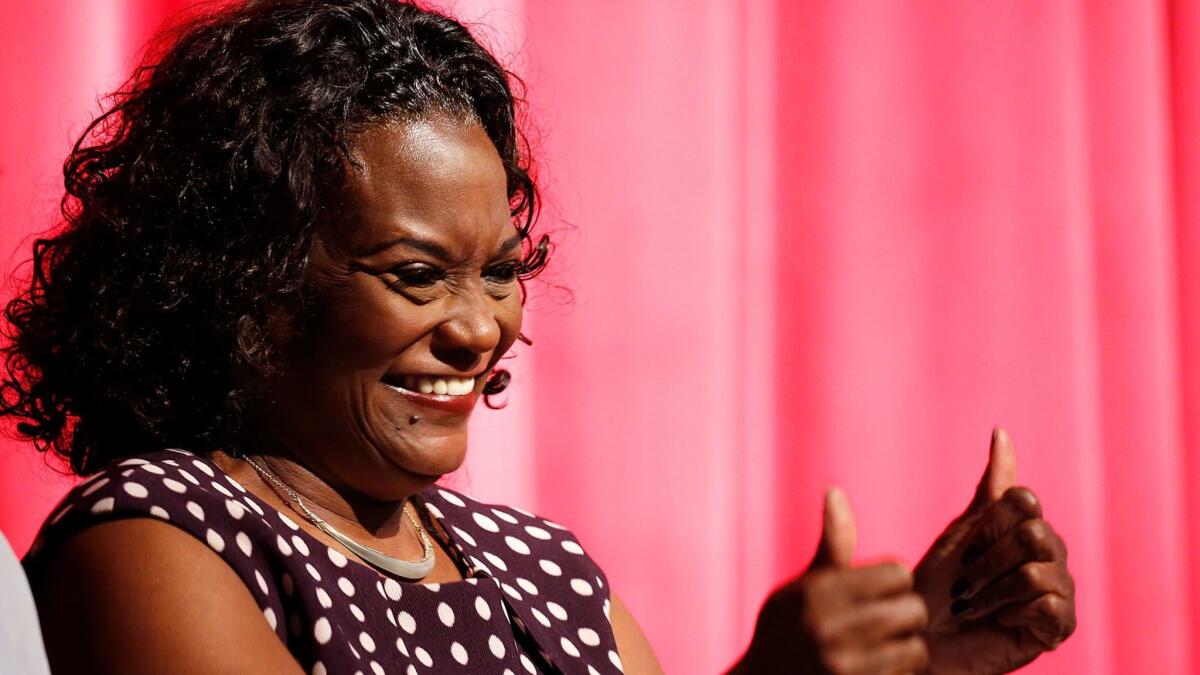L.A. school board won’t vote to approve superintendent’s strategic plan

After months of review, haggling and soul searching, Los Angeles Board of Education members this week avoided voting on a strategic plan developed by Supt. Michelle King.
She’ll go ahead with it anyway.
The plan’s centerpiece is a target of 100% graduation, which has never been achieved by a large school district and possibly not by a small one either. It isn’t clear in the plan when the nation’s second-largest school system is supposed to get there or achieve other lofty goals.
That point was made Tuesday by board member Ref Rodriguez at a board committee meeting held to review King’s latest version with the help of a professional mediator. Rodriguez was one of several board members who seemed willing, until the end of the gathering, to give the plan a vote of approval.
In 17 pages of fairly large text, King pledges in the plan to develop a network of systems and measures to track student progress toward graduation from preschool onward.
Her latest, freshly unveiled draft puts more emphasis on early childhood education and schools with low academic achievement, King said in an interview after the meeting.
L.A. Unified made surprising progress on its graduation rate this year, with a record 75%, but that may have been achieved through lower academic standards in some makeup classes and other options students used to earn academic credits quickly. It’s hard to assess because of imprecise record-keeping that has made it difficult to determine, in many cases, which options students used and how many graduated because of them.
Under the strategic plan, the graduation targets for this year and the next two are 77%, 79% and 81%, respectively. The plan also promises high academic standards.
The board’s action — or lack of action — deflated what was supposed to be a dramatic, pivotal and unifying process: creating a blueprint for school success in perilous times. The district faces many challenges: financial uncertainty, declining enrollment and trepidation about what a Trump administration might mean for its large immigrant student population.
The board’s formal vote on King’s plan was supposed to take place, by acclamation, at next week’s school board meeting.
“We have to start putting a stake in the ground,” Rodriguez said early on in Tuesday’s discussion. “It’s about us galvanizing around” the plan.
Instead, the seven-member body decided at the committee meeting not to vote at all. King, they determined, could use her own authority to press onward as she wished.
Presumably, the board still will hold her accountable if she falls short in carrying out the plan or if members later decide that it wasn’t so great in the first place. In any event, their names won’t be on it.
All told, King attempts in her plan to balance grand ambitions and optimistic realism — as have other past and current leaders of urban school districts.
Many education researchers would be impressed if the district hits its incremental targets. For example, the plan calls for increasing the number of students eligible to apply to a four-year state college from a projected 48% this year to 52% in 2019.
In 2005, in an earlier pie-in-the-sky promise the district vowed that this college-eligible rate was going to hit 100% by June 2016. Board member Monica Garcia defended this approach, saying such stratospheric goals had spurred remarkable improvement, even if much more remained to be done.
Without an operation plan, to me, it’s just words on a page.
— board member Monica Ratliff
The decision Tuesday to sidestep a vote coalesced in seconds, after board member George McKenna mused about that option. His rationale was fairly obvious. He was lukewarm. He wanted to see a greater emphasis on preventing dropouts. He is also concerned that the emphasis on achieving 100% graduation could put too much focus on those who make it to senior year — drawing it away from working to rescue the much younger students who fall by the wayside as early as elementary school.
Some other board members did not state so clearly why they preferred not to vote.
But one issue that clearly stuck in their craw was that the plan laid out a vision but offered few concrete details about how the district would get there and how staff would be held accountable.
“Without an operation plan,” board member Monica Ratliff said, “to me, it’s just words on a page.”
King said that would be the next step, but goals had to come first. Already, she’d made changes in response to board input at previous meetings. And she continued to take notes during this roundtable, which was held in an ad hoc conference room at the downtown Union Bank Plaza.
At one point, even facilitator Jeff Nelsen, the consultant brought in to mediate, described the proceedings as “tedious.” At the end of four grueling hours, even King seemed relieved that she could move forward, even if she had to do so without the explicit approval of her employers.
Twitter: @howardblume
MORE EDUCATION NEWS
American teens’ math scores fall on an international test
Students are anxious about Trump, so the L.A. public school district started a support hotline
More to Read
Start your day right
Sign up for Essential California for news, features and recommendations from the L.A. Times and beyond in your inbox six days a week.
You may occasionally receive promotional content from the Los Angeles Times.







